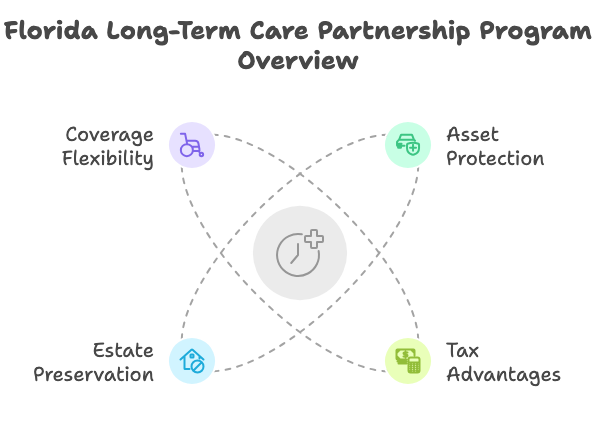
Long-Term Care Partnership Programs
September 27, 2023
R. Gardner Sherrill MBA, CFP
connect with us
®
Personalized Financial Planning
For a confident retirement
Guiding Your Retirement Journey with Integrity & expertise
investing
post categories
economy
As life expectancy increases, many more people will require long-term care. Frequently, this takes the form of custodial care—that is, help with the activities of daily living, either provided by an in-home caregiver or in an assisted living facility or nursing home. Most health insurance programs, including Medicare, do not cover custodial care, and Medicaid is limited to low-income seniors. Because paying for long-term care impoverishes many seniors, Medicaid ends up footing much of the long-term care bill.
What Are Partnership Policies?
To help relieve the overburdened Medicaid system, many states have implemented versions of the federal Long-Term Care Partnership Program. Through these programs—a collaboration between states and private insurance companies—individuals can purchase special long-term care insurance (LTCI) with the assurance that they can continue to receive long-term care services through Medicaid after their coverage is exhausted. Furthermore, participants can qualify for Medicaid without having to spend down their assets to the level typically required, assuming they meet other eligibility requirements.
A partnership policy is similar to traditional LTCI except that it includes a “lifetime asset protection” feature, which ensures that long-term care expenses won’t reduce you or your family to poverty. Each state’s rules vary, but partnership policies generally take a dollar-for-dollar asset protection approach. This means that for each dollar, the partnership policy pays in benefits for your care, you can protect a dollar of your assets from Medicaid spend-down requirements, should you need to apply for Medicaid benefits.
In addition, assets protected by a partnership policy can be given away without affecting your Medicaid eligibility. When you die, the state will not attempt to recover those assets from your estate. However, it’s important to note that though a partnership policy allows you to retain some of your assets, you may still need to spend your income on long-term care before Medicaid covers your expenses.
As with traditional LTCI, you must meet the underwriting requirements of the issuing insurance company to qualify for a partnership policy. Partnership policies generally cost the same as other long-term care policies, but they include age-based inflation protection and must be tax-qualified. Some states require minimum daily benefits.
If you purchase a partnership-qualified plan in one state and move to another, most states offer reciprocity in coverage. This means the new state will honor the partnership-qualified policy agreement if the prior state offers reciprocity. One notable exception is California, which does not provide reciprocity of coverage.
How Do Partnership Policies Work?
For example, Joe purchases a partnership policy with a total lifetime benefit of $200,000. Later, he qualifies for benefits and begins to receive long-term care services. Thanks to the inflation protection built into the policy, the lifetime benefit grows to $500,000 over the years. The policy is depleted after paying out $500,000 in benefits for Joe’s long-term care.
Joe can now apply for Medicaid coverage for his ongoing long-term care services. He can protect $500,000 in countable assets from Medicaid eligibility spend-down requirements (over and above the state maximum in countable assets). Without the partnership program, he would be required to spend down his assets to the mandated poverty level to qualify for Medicaid. Of course, he still needs to use his income to pay for care and meet all other state Medicaid eligibility requirements.
A Key Consideration
Like traditional LTCI, partnership-qualified (PQ) policies can help you protect your independence and dignity, helping to ensure that you won’t have to depend on others to care for you. They can also protect your financial plan from potentially catastrophic uncovered healthcare expenses. Your financial advisor can discuss all the options with you and help you select the best long-term care coverage for you and your family.
This material has been provided for general informational purposes only and does not constitute either tax or legal advice. Although we go to great lengths to ensure our information is accurate and useful, we recommend you consult a tax preparer, professional tax advisor, or lawyer.
Personalized Financial Planning, for a a confident retirement, based in Bradenton, FL - Serving clients across the US | Guiding your retirement with integrity and expertise.
Quick Contact Info
2520 Manatee Avenue West
Suite 200
Bradenton, FL 34205
info@sherrillwealth.com
941-745-2201
Site Menu
Site Menu
Our Services
Retirement Planning
Investment Management
Social Security Timing
Retirement Income
Tax Planning
Insurance Optimization
Estate and Legacy Planning
Retirement Readiness Masterclass
TO TOP
Advisory services offered through Commonwealth Financial Network®, a Registered Investment Advisor.
Information presented on this site is for informational purposes only and does not intend to make an offer or solicitation for the sale or purchase of any product or security.
Certified Financial Planner Board of Standards
Center for Financial Planning, Inc. owns and licenses the certification marks CFP®, CERTIFIED FINANCIAL PLANNER®, and CFP® (with plaque design) in the United States to Certified Financial Planner Board of Standards, Inc., which authorizes individuals who successfully complete the organization’s initial and ongoing certification requirements to use the certification mark.
This communication is strictly intended for individuals residing in the United States.
© 2012-2024 Sherrill Wealth Management | Privacy Policy | site credits
© 2012-2024 Sherrill Wealth Management
PRIVACY POLICY | site credits